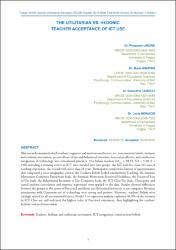The uilitarian vs. hedonic teacher acceptance of ict use

View/
Access
info:eu-repo/semantics/openAccessAttribution-NonCommercial 3.0 United Stateshttp://creativecommons.org/licenses/by-nc/3.0/us/Date
2019Metadata
Show full item recordCitation
Limone, P., Sinatra, M., Tanucci,G., Monacis, L. (2019). The uilitarian vs. hedonic teacher acceptance of ict use. TOJDE, 20 (4), 1-10.Abstract
This research examined which teachers’ cognitive and motivational factors, i.e., constructivist beliefs, intrinsic and extrinsic motivation, perceived ease of use and behavioral intention, fostered an effective and satisfactory integration of technology into educational practices. 374 Italian teachers (MAge = 38.69, SD = 5.30; F = 198) attending a training course in ICT were divided into two groups: the first with less than 20 years of teaching experience, the second with more than 21 years. Participants completed a battery of questionnaires that comprised a socio-anagraphic section, the Teacher’s Beliefs Scale-Constructivist Teaching, the Intrinsic Motivation-Computer Enjoyment Scale, the Extrinsic Motivation-Perceived Usefulness, the Perceived Ease of Use Scale, the Behavioural Intention to Use Computer Scale, the ICT Class Use Scale. Descriptive and causal analyses (correlation and stepwise regression) were applied to the data. Results showed differences between the groups in the scores of Perceived usefulness and Behavioral intention to use computer. Bivariate associations with Classroom use of technology were strong and positive. Moreover, teachers’ Beliefs were strongly related to all motivational factors. Model 5 of regression analysis explained 46.9% of the variance in ICT Class use and indicated the highest value of Perceived enjoyment, thus highlighting the teachers’ hedonic-oriented motivation.
Source
Turkish Online Journal of Distance Education-TOJDEVolume
20Issue
4Collections
The following license files are associated with this item:


















